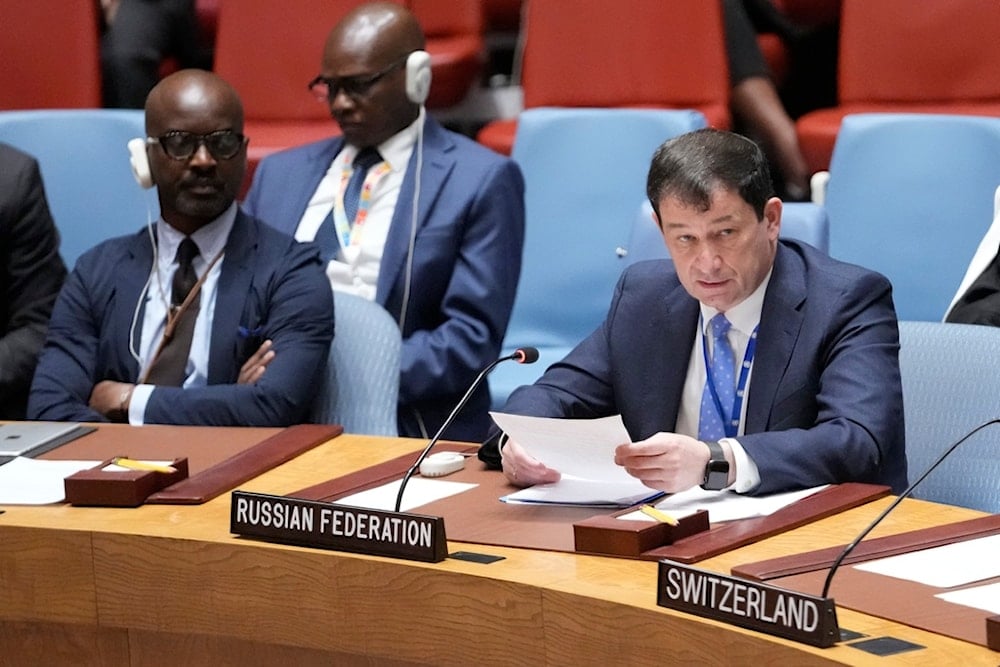Russia slams US, Israeli strikes on Iran, warns of major war
Russia warns US and Israeli attacks on Iran nearly triggered regional war, calls the strikes a violation of international law and nuclear non-proliferation.
-

Russian Deputy Ambassador to the United Nations Dmitry Polyansky speaks during a Security Council meeting on the situation in Ukraine, Monday, July 17, 2023, at United Nations headquarters. (AP)
Russia has issued a strong condemnation of the recent US and Israeli military strikes on Iran, warning that the attacks brought the entire Middle East to the brink of a catastrophic war. Speaking at a United Nations Security Council session on Wednesday, Russian Deputy Ambassador Dmitry Polyanskiy denounced the actions as a violation of international law and a threat to nuclear non-proliferation efforts.
"We strongly and unequivocally condemn the attacks on the Islamic Republic of Iran," Polyanskiy stated. "By committing this act of aggression, Washington and West Jerusalem have put the region on the brink of a great war that could have the gravest radiological consequences—not only for the inhabitants of Iran, but for the entire Middle East."
He labeled the strikes "unjustifiable," emphasizing that they represented a severe breach of the UN Charter and undermined the global nuclear non-proliferation regime.
Iran pledges response as ceasefire holds
The comments come amid a fragile ceasefire following a 12-day military confrontation between Iran and the Israeli regime, which began with Israeli claims that Tehran was secretly pursuing a nuclear weapons program, a charge Iran has repeatedly denied. The confrontation escalated when the United States joined the hostilities with a one-time strike on Iranian nuclear facilities on June 22. Iran retaliated the next night with missile strikes on the US Al Udeid base in Qatar.
Iranian President Masoud Pezeshkian, in his first televised interview since the ceasefire, said Tehran was prepared to respond to any renewed aggression from the Israeli occupation.
Despite the accusations, the International Atomic Energy Agency (IAEA) has stated that it has not found concrete evidence of an active Iranian nuclear weapons program. “Iran denies the military dimension of its nuclear program,” IAEA Director General Rafael Grossi reiterated on June 18.
The short-lived war came to an end on June 23, after US President Donald Trump announced that both sides had agreed to a ceasefire.
Measured retaliation
The confrontation began on June 13, when the Israeli regime carried out unprovoked strikes on Iranian nuclear and military sites, a move widely condemned by Tehran as a blatant act of aggression.
Iran's response was swift, precise, and unprecedented: waves of missiles and drones targeted Israeli intelligence hubs, military compounds, and strategic infrastructure. Despite Tel Aviv's advanced defense systems, a significant number of projectiles reached their targets, forcing even Israeli officials to admit to extensive damage.
According to figures published by the occupation's own Finance Ministry, the war inflicted over 10 billion shekels (approx. $3 billion) in direct losses, excluding the cost of replenishing defense systems. Israeli Finance Minister Bezalel Smotrich estimated the total burden could climb to $12 billion, at a time when "Israel" is already economically strained by years of military aggression. Even Trump acknowledged the scale of destruction, remarking, "Those ballistic missiles, boy, they took out a lot of buildings."

 4 Min Read
4 Min Read









